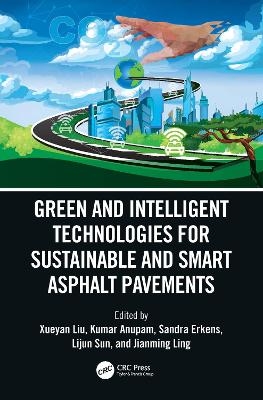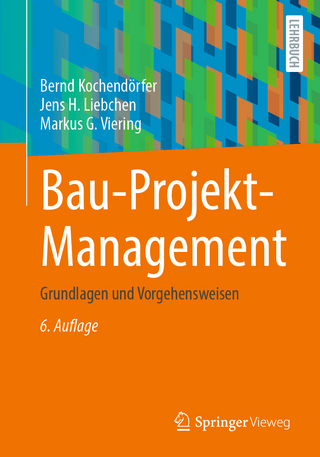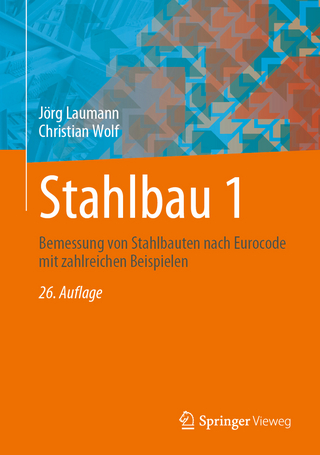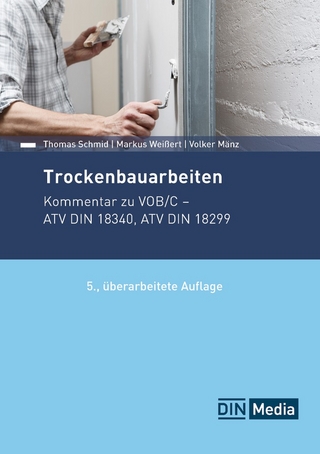
Green and Intelligent Technologies for Sustainable and Smart Asphalt Pavements
CRC Press (Verlag)
978-1-032-16954-5 (ISBN)
Green and Intelligent Technologies for Sustainable and Smart Asphalt Pavements contains 124 papers from 14 different countries which were presented at the 5th International Symposium on Frontiers of Road and Airport Engineering (IFRAE 2021, Delft, the Netherlands, 12-14 July 2021). The contributions focus on research in the areas of "Circular, Sustainable and Smart Airport and Highway Pavement" and collects the state-of-the-art and state-of-practice areas of long-life and circular materials for sustainable, cost-effective smart airport and highway pavement design and construction. The main areas covered by the book include:
• Green and sustainable pavement materials
• Recycling technology
• Warm & cold mix asphalt materials
• Functional pavement design
• Self-healing pavement materials
• Eco-efficiency pavement materials
• Pavement preservation, maintenance and rehabilitation
• Smart pavement materials and structures
• Safety technology for smart roads
• Pavement monitoring and big data analysis
• Role of transportation engineering in future pavements
Green and Intelligent Technologies for Sustainable and Smart Asphalt Pavements aims at researchers, practitioners, and administrators interested in new materials and innovative technologies for achieving sustainable and renewable pavement materials and design methods, and for those involved or working in the broader field of pavement engineering.
Dr. Xueyan Liu is an associate professor in the Section of Pavement Engineering of the Faculty of Civil Engineering & Geosciences of TU Delft. He works in the areas of constitutive modelling, numerical modelling and material experimental characterization. Within the research program of the Section Pavement Engineering, his research topics mostly relate to the development and implementation of constitutive models for the simulation of the static and dynamic response of various pavement engineering materials like soils, asphalt concrete, liner and reinforcing systems etc. and sustainable development technologies, i.e., multiscale modelling of asphaltic materials, warm/cold asphalt concrete technology, durability of asphalt surfacing on orthotropic steel deck bridge, accelerated pavement test, pavement continuous monitoring and sustainable development technologies. Dr. Liu was granted his doctoral thesis in 2003. During the same period, Dr. Liu participated also in the team that developed the ACRe model for Asphalt Concrete Response currently implemented in 3D Computer Aided Pavement Analysis system (CAPA-3D). Dr. Liu has published more than 100 technical and journal papers on the mechanics and the finite element modelling of granular, concrete and asphaltic materials. Dr. Liu is a member of RILEM Technical Committee of Cracking in Asphalt Pavements WG3 and a member of Delft Centre for Materials (DCMat). He is also a member of ISAP, AAPT, APSE and IACMAG. Dr. Liu is an Editorial Board Member of Geomaterials (GM). Dr. Liu was appointed as Board member of the International Association of Chinese Infrastructure Professionals (IACIP) and member of the Academic Committee of the Key Laboratory of Road Structure and Materials Transportation Industry of the China Ministry of Transport. He is also actively involved in organizing inter/national workshops and conferences and was invited as Scientific/Technical committee member of several international conferences. Dr. Kumar Anupam is an assistant professor in the Section of Pavement Engineering, Department of Civil Engineering and Geosciences, Delft University of Technology, the Netherlands. He is actively involved in teaching courses such as Micromechanical modelling of AC, Continuum Mechanics and Pavement Construction and Maintenance. His research activities are related but not limited to performance-based big-data analytics; tire-pavement interactions and micromechanical modeling of AC. He has been involved in several international projects which include FP7 EU projects and projects in the middle east. In national projects, he works in close cooperation with the Rijkswaterstraat, the Netherlands. He is a co-editor of Functional Pavement Design IV: Proceedings of the 4th Chinese - European Workshop on Functional pavement Design, CRC Press and Advances in Materials and Pavement Prediction: Papers from the International, CRC Press. He is an active member of the ISAP, TRB, APSE, iSMARTi and serves on the editorial board member of IJPE. Dr. Anupam holds a Bachelor's degree from Indian Institute of Technology-Roorkee, India and PhD degree from National University of Singapore, Singapore. Professor Sandra Erkens holds the Chair of Pavement Engineering Practice, at Delft University of Technology in the Netherlands and is the head of the Pavement Engineering group at this University. Besides this, she is the principal specialist in pavement materials and structures at Rijkswaterstaat, the Dutch highway authority. Sandra obtained her PhD and MSc in Civil Engineering at the Delft University of technology. She is an internationally acknowledged expert in pavement materials and structures in general and asphalt concrete in particular. She is a member of national and international groups involved in developing technical requirements for pavement materials and in several (inter)national organizations for the dissemination of research. These include the ISAP technical committee on Constitutive Modelling of Asphalt Concrete, the organization committee of the two yearly Dutch conference on Infrastructure (CROW-infradagen) and the organizing committee of the 5th International Symposium on Frontiers of Road and Airport Engineering (IFRAE), of which she is one of the chairs. She has been involved in road engineering research since 1997, has published over a hundred papers and journal articles on her work and is a regular reviewer for conferences and journals on the topic. Prof. Erkens has considerable experience coordinating the cooperation of research organizations, among others as a member of the FEHRL (Forum for European Highway Research Laboratories) executive committee and as Program Team member for InfraQuest, the cooperation between Rijkswaterstaat, TU Delft and TNO building in the Netherlands. She is also one of the founding members and an officer of APSE, the Academy of Pavement Science and Engineering and their past secretary general. Professor Lijun Sun received his Ph.D. degree in 1989. Since 1993, he has been the professor in Department of Road and Traffic Engineering, and a CKSP professor in the College of Transportation Engineering at Tongji University since 1998, vice director of Academic Committee of Tongji university since 2021. He is the dean of Advanced Institute of Intelligent Transportation Studies, and director of Road and Traffic Institute. He received the National Outstanding Youth Research Found in 2003. He is the member of Expert Committee of China Ministry of Transportation, and the member of the council of China Highway Society, China Civil Engineering Society, and China Intelligent Transportation System Society. His research interests focus on the pavement structure, material, and pavement nondestructive evaluation, performance, preventative maintenance management and pavement recycling, as well as intelligent transportation management. He establishes the behavior mechanics for asphalt pavement, first pavement management system of China, and first intelligent traffic guidance system of China. His research results have been incorporated in the specifications of China Ministry of Transportation, China Ministry of Construction, and China Bureau of Civil Aviation for pavement design, evaluation and maintenance. He has published more than 600 technical papers, 13 books in his research fields, and won 3 National Prizes of Science and Technology Progress Awards and 35 provincial-level Science and Technology Progress Awards. He is chief writer of China Specifications of Airport Paving Design, and one of main writers of China Specifications of Asphalt Pavement Design. Professor Jianming Ling is a professor in road and airport engineering and the dean of College of Transportation Engineering, Tongii University. He is the director of Key Laboratory of Infrastructure Durability and Operation Safety in Airfield of CAAC, and the director of Key Laboratory of Road and Traffic Engineering of the Ministry of Education, China. He is also an executive editor-in-chief of "Frontiers of Structural and Civil Engineering." and associate editor-in-chief of " International Journal of Transportation Science and Technology". Prof. Ling received his Ph.D. degree in civil engineering from Tongii University in 1993. His primary research interests are Subgrade Design Theories and Technologies, Airport Infrastructure Design and Management. In the past two decades, Prof. Ling led the research projects on dynamic behavior and design index of sub-grade for MEPDG in China. He also developed the first management system for airport pavement (CAPMS) in China, and a pavement design method for New General Large Air- crafts. Prof. Ling won the second prize of National Science and Technology Progress Award for four times. He was the chief editor of "Code for Design of Urban Road Subgrades", and "Technical Specifications of Airport Pavement Evaluation and Management" of China.
Green and sustainable pavement materials
Recycling technology
Warm & cold mix asphalt materials
Functional pavement design
Self-healing pavement materials
Eco-efficiency pavement materials
Pavement preservation, maintenance and rehabilitation
Smart pavement materials and structures
Safety technology for smart roads
Pavement monitoring and big data analysis
Role of transportation engineering in future pavements
Others
| Erscheinungsdatum | 21.12.2021 |
|---|---|
| Verlagsort | London |
| Sprache | englisch |
| Maße | 174 x 246 mm |
| Gewicht | 1347 g |
| Themenwelt | Technik ► Bauwesen |
| Technik ► Fahrzeugbau / Schiffbau | |
| ISBN-10 | 1-032-16954-0 / 1032169540 |
| ISBN-13 | 978-1-032-16954-5 / 9781032169545 |
| Zustand | Neuware |
| Haben Sie eine Frage zum Produkt? |
aus dem Bereich


